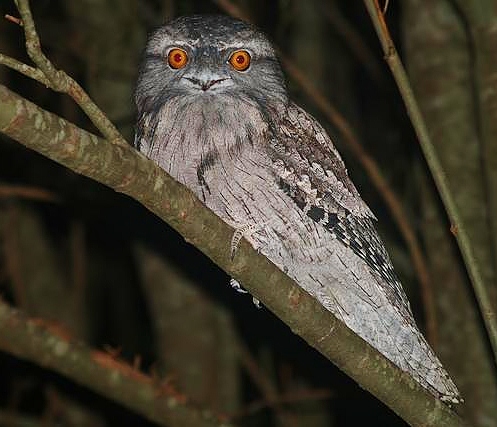Podargus strigoides
 |
| Photo by Rémi Bigonneau (Internet Bird Collection) |
Common name:
tawny frogmouth (en); boca-de-sapo-australiano (pt); podarge gris (fr); podargo australiano (es); eulenschwalm (de)
Taxonomy:
Order Caprimulgiformes
Family Podargidae
Range:
This species is found throughout the Australian mainland, Tasmania and southern New Guinea.
Size:
Tawny frogmouths are 34-53 cm long and weigh up to 670 g.
Habitat:
They are mostly found in deciduous forests, tree plantations and suburban gardens. They can also be found in grassland areas with scattered trees, but are absent of desert areas with no trees and from evergreen rainforests where the trees do not shed leaves.
Diet:
The tawny frogmouth mostly eats nocturnal insects, snails, slugs ans worms. They may also take small mammals, reptiles, frogs and even birds. They usually get their prey by swooping down from a perches, taking the prey either from the ground or in flight.
Breeding:
These birds breed in August-December. The nest is a loose platform of sticks, which is usually placed on a horizontal forked tree branch. There the female lays 2-3 eggs which are incubated by both parents for about 30 days. The chicks are fed by both parents and fledge 30-35 days after hatching.
Conservation:
IUCN status – LC (Least Concern)
This species has a very large breeding range and, although the global population size has not been quantified, the species is reported to be generally common. Tawny frogmouth are often hit by cars while chasing insects illuminated in the beam of the headlights, but the the population is suspected to be stable in the absence of evidence for any declines or substantial threats.







